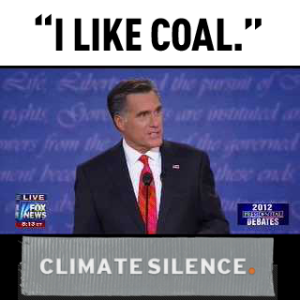As everyone analyzes last night’s first presidential debate, it seems that a focus on the important and often urgent concerns of voters were sidelined by concern with style and appearance, resulting in a journalistic award of a “victory” for Mitt Romney. This win for Romney clearly signals an ideological loss for the green movement.
First and foremost, Mr. Romney brazenly misstated President Obama’s investment in “green energy”, erroneously claiming that the administration had spent $90 billion on “green energy”, but that half of the companies that he had spent the money on had failed. A report by the Washington Post declares this is a “flat-out false claim”. Rather, the $90 billion was the sum set aside for “green” tech and research in the stimulus bill. A substantial portion of these funds was used for efficiency projects, research and development, carbon sequestration, and upgrading the nation’s electric grid, among other projects. Only a small percentage was spent on direct loans to clean energy companies, and contrary to Romney’s statement, very few of these companies have failed.
Secondly, to the dismay of the electric car industry, Romney called electric car companies “losers”, specifically Tesla, which is well on its way to becoming a successful and profitable business. While President Obama did not call Mr. Romney out on the importance of clean energy and electric cars, he did look the camera in the eye and spoke to the American people, noting that he differed from Romney in that he was more interested in the development of renewable energy sources. Additionally, he voiced the need to end federal oil subsidies. Perhaps Romney summed up his commitment to the protection of the environment and the health and safety of its inhabitants by stating, “I like coal”.
Proponents of the green movement also are disappointed that Jim Lehrer, as moderator, disregarded climate control as an issue even worthy of discussion in the debate. Despite receiving 160,000 letters from a coalition of nonprofit organizations dedicated to green initiatives requesting discussion on climate change, Mr. Lehrer ignored this issue. Supposedly, the purpose of the debate was to give millions of voters an opportunity to “hear how the candidates plan to address the nation’s most urgent challenges”. It appears that the moderator does not consider the climate crisis that important or urgent.
The green movement is a strong and dedicated one that is not going to go away. It will not and cannot be dismissed alongside Big Bird. While it cannot force a discussion of its issues at a debate, it can ensure that it is a force to be reckoned with at the ballot box. It is clear to the green movement that climate change is devastating and a threat to our very existence. Any discussion on education, construction, health care, or job creation must include climate change and environmental concerns to be effective. Any voter who is concerned about health, welfare, employment and family issues and who wants to make sure there will be a healthy planet around for their children to inherit has a clear choice. Hopefully, we will live green, be green.


